Lesson33&May&be&you&will&be&a&teacher
【经典】新概念二Lesson_33_知识点整理

Lesson 33 Out of the Darkness 冲出黑暗学习目标全必记单词darkness n. 黑暗explain v. 解释,说明coast n. 海岸storm n. 暴风雨towards prep. 朝,向,接近rock n. 岩石shore n. 海岸light n. 灯光ahead adv. 在前面cliff n. 峭壁struggle v. 挣扎hospital n. 医院常考短语be able to 能够set out 出发be caught in (突然)遇到/上(风暴等)towards evening 天越来越晚a distance of 多长的距离a light ahead 前方的一盏灯经典句型1.Nearly a week passed b efore the girl was able to explainwhat had happened to her.2.One afternoon she set out from the coast in a small boat andwas caught in a storm.3.Towards evening, the boat struck a rock and the girl jumpedinto the sea.4.、Then she swam to the shore after spending the whole nightin the water.5.During that time she covered a distance of eight miles.解重点语法(1) 表示“上、下”的两对小品词是on和off,up和downJim’s standing on the roof. I hope he won’t fall off. Tom’s climbing up the tree. I hope he won’t fall down.(2) 表示“来、去”的一对小品词是from和to;towards(强调越来越近)的意义和to(强调目标)相近,表示“朝,向,接近”等;for 在有些动词后面也表示“往,向”的意思The ball was coming towards me.The plane flies from Moscow to New York.He went for home.leave for… 动身到某地(强调离开,出发)Yesterday my father left for Tianjin.set out for… 动身到某地He left/ set out for New York yesterday.head for/to 前往(强调“去”)(3) 表示“进去,出来”这两种方向的介词为into(进、入)和out of(从...出来);表示“在某个地方”或“在……里面/外面”可用at(含有一种瞄准的概念,方向性),in,out of等;表示目的地或位置往往用ataim at,fire at(瞄准开火),throw at,threw to the bankTell him go into my house.Did you stop anywhere on your way to the office?去办公室的路上你在别的地方逗留过吗?(4) 表示“穿过,越过,绕过”等动词时,往往用through,across,under,over,round等介词How did you get through the fence? 你怎么穿过篱笆的?How did you get over the wall? .2. Pass and Pastpass和past的区别主要是词义上的区别,pass是动词,其解重点语法(1) 表示“上、下”的两对小品词是on和off,up和downJim’s standing on the roof. I hope he won’t fall off. Tom’s climbing up the tree. I hope he won’t fall down.(2) 表示“来、去”的一对小品词是from和to;towards(强调越来越近)的意义和to(强调目标)相近,表示“朝,向,接近”等;for 在有些动词后面也表示“往,向”的意思The ball was coming towards me.The plane flies from Moscow to New York.He went for home.leave for… 动身到某地(强调离开,出发)Yesterday my father left for Tianjin.set out for… 动身到某地He left/ set out for New York yesterday.head for/to 前往(强调“去”)(3) 表示“进去,出来”这两种方向的介词为into(进、入)和out of(从...出来);表示“在某个地方”或“在……里面/外面”可用at(含有一种瞄准的概念,方向性),in,out of等;表示目的地或位置往往用ataim at,fire at(瞄准开火),throw at,threw to the bankTell him go into my house.Did you stop anywhere on your way to the office?去办公室的路上你在别的地方逗留过吗?(4) 表示“穿过,越过,绕过”等动词时,往往用through,across,under,over,round等介词How did you get through the fence? 你怎么穿过篱笆的?How did you get over the wall? .2. Pass and Pastpass和past的区别主要是词义上的区别,pass是动词,其解重点语法(1) 表示“上、下”的两对小品词是on和off,up和downJim’s standing on the roof. I hope he won’t fall off. Tom’s climbing up the tree. I hope he won’t fall down.(2) 表示“来、去”的一对小品词是from和to;towards(强调越来越近)的意义和to(强调目标)相近,表示“朝,向,接近”等;for 在有些动词后面也表示“往,向”的意思The ball was coming towards me.The plane flies from Moscow to New York.He went for home.leave for… 动身到某地(强调离开,出发)Yesterday my father left for Tianjin.set out for… 动身到某地He left/ set out for New York yesterday.head for/to 前往(强调“去”)(3) 表示“进去,出来”这两种方向的介词为into(进、入)和out of(从...出来);表示“在某个地方”或“在……里面/外面”可用at(含有一种瞄准的概念,方向性),in,out of等;表示目的地或位置往往用ataim at,fire at(瞄准开火),throw at,threw to the bankTell him go into my house.Did you stop anywhere on your way to the office?去办公室的路上你在别的地方逗留过吗?(4) 表示“穿过,越过,绕过”等动词时,往往用through,across,under,over,round等介词How did you get through the fence? 你怎么穿过篱笆的?How did you get over the wall? .2. Pass and Pastpass和past的区别主要是词义上的区别,pass是动词,其解重点语法(1) 表示“上、下”的两对小品词是on和off,up和downJim’s standing on the roof. I hope he won’t fall off. Tom’s climbing up the tree. I hope he won’t fall down.(2) 表示“来、去”的一对小品词是from和to;towards(强调越来越近)的意义和to(强调目标)相近,表示“朝,向,接近”等;for 在有些动词后面也表示“往,向”的意思The ball was coming towards me.The plane flies from Moscow to New York.He went for home.leave for… 动身到某地(强调离开,出发)Yesterday my father left for Tianjin.set out for… 动身到某地He left/ set out for New York yesterday.head for/to 前往(强调“去”)(3) 表示“进去,出来”这两种方向的介词为into(进、入)和out of(从...出来);表示“在某个地方”或“在……里面/外面”可用at(含有一种瞄准的概念,方向性),in,out of等;表示目的地或位置往往用ataim at,fire at(瞄准开火),throw at,threw to the bankTell him go into my house.Did you stop anywhere on your way to the office?去办公室的路上你在别的地方逗留过吗?(4) 表示“穿过,越过,绕过”等动词时,往往用through,across,under,over,round等介词How did you get through the fence? 你怎么穿过篱笆的?How did you get over the wall? .2. Pass and Pastpass和past的区别主要是词义上的区别,pass是动词,其解重点语法(1) 表示“上、下”的两对小品词是on和off,up和downJim’s standing on the roof. I hope he won’t fall off. Tom’s climbing up the tree. I hope he won’t fall down.(2) 表示“来、去”的一对小品词是from和to;towards(强调越来越近)的意义和to(强调目标)相近,表示“朝,向,接近”等;for 在有些动词后面也表示“往,向”的意思The ball was coming towards me.The plane flies from Moscow to New York.He went for home.leave for… 动身到某地(强调离开,出发)Yesterday my father left for Tianjin.set out for… 动身到某地He left/ set out for New York yesterday.head for/to 前往(强调“去”)(3) 表示“进去,出来”这两种方向的介词为into(进、入)和out of(从...出来);表示“在某个地方”或“在……里面/外面”可用at(含有一种瞄准的概念,方向性),in,out of等;表示目的地或位置往往用ataim at,fire at(瞄准开火),throw at,threw to the bankTell him go into my house.Did you stop anywhere on your way to the office?去办公室的路上你在别的地方逗留过吗?(4) 表示“穿过,越过,绕过”等动词时,往往用through,across,under,over,round等介词How did you get through the fence? 你怎么穿过篱笆的?How did you get over the wall? .2. Pass and Pastpass和past的区别主要是词义上的区别,pass是动词,其解重点语法(1) 表示“上、下”的两对小品词是on和off,up和downJim’s standing on the roof. I hope he won’t fall off. Tom’s climbing up the tree. I hope he won’t fall down.(2) 表示“来、去”的一对小品词是from和to;towards(强调越来越近)的意义和to(强调目标)相近,表示“朝,向,接近”等;for 在有些动词后面也表示“往,向”的意思The ball was coming towards me.The plane flies from Moscow to New York.He went for home.leave for… 动身到某地(强调离开,出发)Yesterday my father left for Tianjin.set out for… 动身到某地He left/ set out for New York yesterday.head for/to 前往(强调“去”)(3) 表示“进去,出来”这两种方向的介词为into(进、入)和out of(从...出来);表示“在某个地方”或“在……里面/外面”可用at(含有一种瞄准的概念,方向性),in,out of等;表示目的地或位置往往用ataim at,fire at(瞄准开火),throw at,threw to the bankTell him go into my house.Did you stop anywhere on your way to the office?去办公室的路上你在别的地方逗留过吗?(4) 表示“穿过,越过,绕过”等动词时,往往用through,across,under,over,round等介词How did you get through the fence? 你怎么穿过篱笆的?How did you get over the wall? .2. Pass and Pastpass和past的区别主要是词义上的区别,pass是动词,其解重点语法(1) 表示“上、下”的两对小品词是on和off,up和downJim’s standing on the roof. I hope he won’t fall off. Tom’s climbing up the tree. I hope he won’t fall down.(2) 表示“来、去”的一对小品词是from和to;towards(强调越来越近)的意义和to(强调目标)相近,表示“朝,向,接近”等;for 在有些动词后面也表示“往,向”的意思The ball was coming towards me.The plane flies from Moscow to New York.He went for home.leave for… 动身到某地(强调离开,出发)Yesterday my father left for Tianjin.set out for… 动身到某地He left/ set out for New York yesterday.head for/to 前往(强调“去”)(3) 表示“进去,出来”这两种方向的介词为into(进、入)和out of(从...出来);表示“在某个地方”或“在……里面/外面”可用at(含有一种瞄准的概念,方向性),in,out of等;表示目的地或位置往往用ataim at,fire at(瞄准开火),throw at,threw to the bankTell him go into my house.Did you stop anywhere on your way to the office?去办公室的路上你在别的地方逗留过吗?(4) 表示“穿过,越过,绕过”等动词时,往往用through,across,under,over,round等介词How did you get through the fence? 你怎么穿过篱笆的?How did you get over the wall? .2. Pass and Pastpass和past的区别主要是词义上的区别,pass是动词,其。
新概念英语第3册课程讲义Lesson33

Lesson 33 A day to rememberprelude ['prelju:d]n. 序幕,前奏prelude (to sth.)The high wind is the prelude to a heavy storm.prologue (to …)preface (to …)foreword (to …)epilogue (to …)unforeseen [ʌnfɔ:'si:n]adj. 意料之外的unforeseen unexpectedforesee expectforetell predictTimely snow foretells a bumper harvest.forecast weather forecastseries ['sɪəri:z]n. 系列series speciesa series of booksa series of stampsA series of rainy days spoiled my vacation.a chain of …a train of …a trail of …a string of …a stream of …catastrophe [kə'tæstrəfɪ]n. 大灾难mishapaccident contingencydisastercalamity catastrophecrockery ['krɒkəri]n. 陶器crockery potteryearthenwarechina chinawareporcelainsuburb ['sʌbɜ:b]n. 郊区suburb suburbanrural urbanmetropolitan cosmopolitanpanic ['pænɪk]n. 惊慌get into a panic in a panicHe fled in a panic.Don’t panic in case of fire.panic panicked ~ panickingpicnic picnicked ~ picnickingstray [streɪ]adj. 迷路的,偏离的;v. 迷路,偏离a stray dog / boy / bulletstray sheepSome of the cattle have strayed.Don’t stray from the point.confusion [kən'fju:ʒən]n. 混乱;迷惑confuse confused confusingdisorder in disorder messin a messchaos in (a state of) chaosAll the things I had packed so carefully were soon in a dreadful mess.Without it, nothing could ever be brought to a conclusion; everything would be in a state of chaos.greedily ['gri:dɪlɪ]adv. 贪婪地greedy gluttonousthe seven deadly sins:greed gluttonylust envywrath sloth pride… to rememberGandalf, my old friend … this will be a night to remember.go wrong 出错,出问题,不顺利We have all experienced days when everything goes wrong.Our marriage began to go wrong after we had our first child.Something’s gone wrong with my computer.An advertisement which begins with the magic word FREE can rarely go wrong.It is all too easy to blame the railway authorities when something does go wrong.We have all experienced days when life seems to be a bowl of cherries.We have all experienced moments of misery and despair.suddenlyall of a suddenall at onceSeeing a cake flying through the air, a lorry driver who was drawing up alongside the car, pulled up all of a sudden.All at once, I noticed that my wife seemed to be filled with alarm.get out of control / hand(A) Discuss the situation with the person in charge of the dormitory.(B) Ask her roommate not to make so much noise.(C) Go to bed after midnight.(D) Send a letter to the residents.W: You know the noise in my dorm has really gotten out of control. My roommate and I can rarely get to sleep before midnight.M: Why don’t you take the problem up with the dorm supervisor?Q: What does the man suggest the woman do?Answer: (A) Discuss the situation with the person in charge of the dormitory.We started burning some leaves in our yard, but the fire got _____ and we had to call the fire department to put it out.(A) out of hand (B) out of order(C) out of the question(D) out of the wayget sth. under control(A) The air will be cleaner if they go to a different city.(B) It’ll soon be too late to control the pollution.(C) Society will not pay attention to the new laws.(D) The situation will improve if changes are made.M: Look at all the pollution going into the air from those factories. Do you think they’ll ever get that under control?W: With the new laws and social awareness, we’ll turn things around.Q: What does the woman predict will happen?Answer: (D) The situation will improve if changes are made.What invariably happens is that a great number of things choose to go wrong at precisely thesame moment.what invariably happens is that …往往总是……造句:往往总是干得最多的人收入最少。
新概念第二册Lesson 33
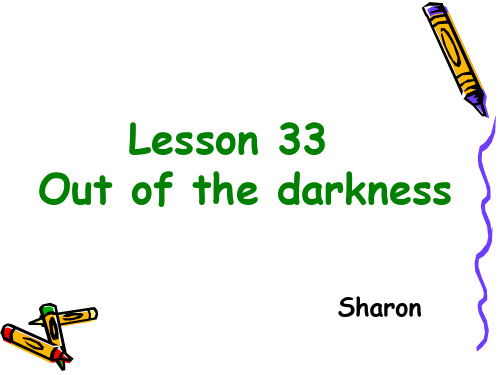
9. cliff
n.峭壁
cliff
1.n.悬崖 e.g.:站在悬崖上 stand on the edge of a cliff
峭壁:vertical cliff
struggle
1.V.(与for,to连用)斗争,奋斗 (与with,against连用)挣扎,博斗 (与along,up,through,in,on连用 )在困难中求生 e.g.:1)我争取自由 I struggled to get freedom. 2)与困难做斗争 struggle against difficulties
hospital
1.n.医院 field hospital 战地医院 be in hospital 住院
表示方位的介词:to,from,into,out of,for, towards,at,up,down与动词的组合 例如:fly from…to从…飞到… get into(out of)从…进入/出来 leave for 离开前往某地 set out for 出发去某地 come towards去某地 throw sth at sb 朝某人扔… point at sb 指向某人
→ explain away (把过失,怀疑等)搪塞过去 e.g.: How can she explain away her error? → explain oneself 说明自己的意思/动机 e.g.: But he does not just admit oneself is, always tries to explain away for oneself. → explain … as… 把…解释成… e.g.: He explained his faults as miss.
九年级英语下册Lesson33教材内容详解冀教版
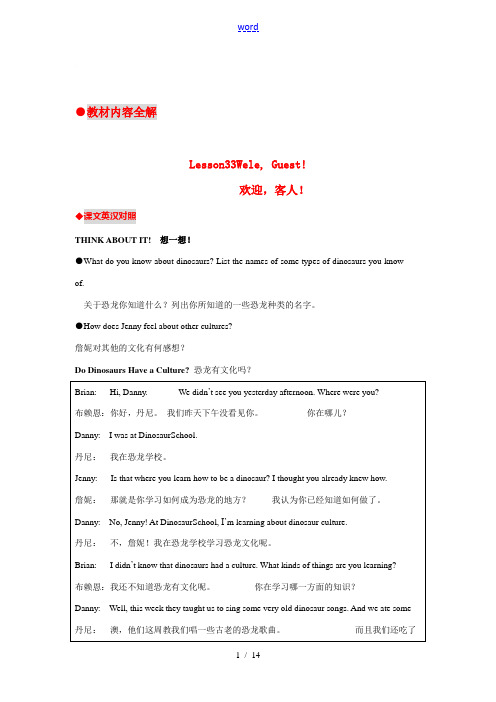
●教材内容全解Lesson33Wele, Guest!欢迎,客人!◆课文英汉对照THINK ABOUT IT! 想一想!●What do you know about dinosaurs? List the names of some types of dinosaurs you know of.关于恐龙你知道什么?列出你所知道的一些恐龙种类的名字。
●How does Jenny feel about other cultures?詹妮对其他的文化有何感想?Do Dinosaurs Have a Culture? 恐龙有文化吗?Brian: Hi, Danny. We didn’t see you yesterday afternoon. Where were you?布赖恩:你好,丹尼。
我们昨天下午没看见你。
你在哪儿?Danny: I was at DinosaurSchool.丹尼:我在恐龙学校。
Jenny: Is that where you learn how to be a dinosaur? I thought you already knew how.詹妮:那就是你学习如何成为恐龙的地方?我认为你已经知道如何做了。
Danny: No, Jenny! At DinosaurSchool, I’m learning about dinosaur culture.丹尼:不,詹妮!我在恐龙学校学习恐龙文化呢。
Brian: I didn’t know that dinosaurs had a culture. What kinds of things are you learning?布赖恩:我还不知道恐龙有文化呢。
你在学习哪一方面的知识?Danny: Well, this week they taught us to sing some very old dinosaur songs. And we ate some 丹尼:澳,他们这周教我们唱一些古老的恐龙歌曲。
最新新概念英语第二册lesson 33课

After the rain stopped, the workers went ahead with the their work.
雨停后,工人们继续干他们的工作。
________________________ ________________________
• adj. • You have to work hard to keep ahead in
上。
We're now flying high up over the mountains.
我们正在群山上空飞行。
________________________ ________________________
On arriving at the shore, the girl struggled up the cliff towards the light she had seen.
your class.
• ahead of 在……之前 领先于 His mind is always ahead of his time.
• ahead of time 提前 • Luckily, she finished her homework
ahead of time.
• get ahead 取得进步(或进展),进展顺利
beautiful.
________________________ ________________________
Early next morning, she saw a light ahead.She knew she was near the shore because the light was high up on the cliffs. 8.ahead adv.在前面 7. high up 在高处 be high up on the cliffs 在高高的峭壁上 The kite is high up in the sky. 风筝高高地飞在天
新概念英语第二册Lesson33分解

♂ light n. 灯光,光线灯 n. ①光 ②引火物 ③为人所知的情况 ④方面,见解 白天太阳给我们光亮
The sun gives us light during the day. 能借个火吗? Can you give me a light,please? Please turn on the light. 请开灯 light tower 灯塔
We live on the coast shore湖或者海的边缘或水边的狭长陆地,比coast
范围小
She swam to the shore. beach(shore的倾斜部分)往往在涨潮时候被漫
过
The little beach hotel has a pleasant environment.
struggle v. 挣扎
hospital n. 医院
♂darkness n. 黑暗;暗 out of the darkness 冲出黑暗 We couldn’t see the houses in the darkness. The room was in darkness. 房间一片漆黑
dark (黑暗的)+ness(名词后缀)= darkness careful(细心的)+ness= carefulness(仔细) good+ness= goodness(仁慈)
Our boat rocked to and from on the waves.
The President’s death rocked the nation. ['prezɪd(ə)nt] 总统的死震动了全国 搭配: as firm as a rock 屹立不动的,值得信赖的 rock the boat 破坏团体的合作
新概念第二册 Lesson 33 课件 (共17张ppt)

Key Words
3. coast n.海岸 seashore/shore n. 海岸(范围小于coast)
seaside n. 海边
范围
beach n. 沙滩
渐渐
变小
bank n. 河岸,坝,堤
On shore/On the coast 在岸上
Off shore/Off the coast 在近海处
Language focus
1. before the girl was able to explain what had happened to her. ①happen to sb. 某人发生了什么事 eg:Do you know what happened to her yesterday? ②过去完成时指的是“过去的过去”,即在过去的某一时刻之前 或过去发生的某事之前发生的事情,用had + P.P(过去分词) 表示 eg:We held (hold) a sports meeting last week. He told me that he had had(have) a good time in London.
7.shore /ʃɔ:/ n.海岸 8.light /lait/ n.灯光 9.ahead /ə'hed/ adv.在前面 10.cliff /klif/ n.峭壁 11.struggle /'strʌgəl/ v.挣扎 12.hospital /'hɔspitl/ n. 医院
Listen and read
Exercise P157
Thank you! See you next time!
Listening again and answer the question
冀教版英语八年级上册Lesson33课件

sick “有病的”
既可作表语又可作定语
His father is ill/sick in bed. She feels ill/sick. He looks ill/sick. her sick mother 她生病的妈妈 her ill/bad mother 她的坏妈妈 2. should + 动原 He should __________ (speak) loudly yesterday. speak
careful adj.
carefully adv.
He is __________. He is a _________ boy. careful careful
carefully They work ____________ every day.
Learn by yourselves: 1. ill “有病的” 通常作表语 思 作定语时是“bad”的意
It isn’t always easy to live in a new neighbourhood.
汉译英:
I will be glad/sad/ happy when …
1) 她来北海,我会很高兴。
I will be very glad when she comes to Beihai.
2) 他不给我写信,我会很伤心。 I will be very sad when he doesn’t write to me. 3) 你忘记我,我不会不高兴。 I will not be sad when you forget me.
Think
Write down what happened to Brian. 1. What did Brian do this week? 2. What happened to him yesterday?
Lesson_33_Let's_Go_to_the_Zoo!教案

Lesson 33: Let’s Go to the Zoo!洪家中学潘荣●Knowledge aim(1)Master the following words:dream,noise,lion,lonely, miss, forest, course(2)Master the following phrase:go to the zoo, make noises, of course●Ability aimTo talk about their favorite animals with the words they have learned.●Emotional aimAnimals are friends of human beings, advocate "the protection ofanimals, is to protect their own!"Important and difficult points:1.Master vocabulary and structures in this class2.The use of the present continuous tenseTeaching prepare1. ppt;2. pictures of animalsTeaching stepsStepⅠ. Class OpeningT:Boys and girls, do you know a saying like this:When the cat is away, mice will play. Who can translate it into Chinese? Yes, “山中无老虎,猴子称霸王。
” Where can you find them? Yes, let’s go to the zoo!Then show the title “Lesson 33:Let’s Go to the Zoo!” on the screen.StepⅡ. New concepts1. Can you do that?T: Do you know the English for these?Then show students some pictures of animals. Ask them if they can name them. Teacher can say, “I bet you don’t know the names of the animals.” Then teach how to read the new words.2. Read and learn the new words.The teacher will show the new words on the screen first, including both English and Chinese. Ask students to read after the teacher twice. Then the teacher will cover the English words for a while. Ask a student in each group to write down the words on the blackboard as many as he or she can. Then the teacher will show them all the words again. Read the words again.3. Let’s read the text!T:Can you read the text and fill in the blanks? Now I’ll show you and you can have a try!S: Read the text in their groups ,then do some excise.4. I can find the language points!The teacher will ask students to find the language points by themselves after they read the text twice, then ask them to make their own sentences by using the language points. Meanwhile, they can have a match about making sentences during the same time.Do animals have feelings?What can you do for them?6. Listening practice.Ask Ss to do Let’s do it! No 1: Listen to the statements and circle the correct pictures.7. Let’s do it!T: Now let’s read the lesson and circle the correct words. Do you remember which animal is lonely? Let’s see who has the best memory in our class. S1, can you tell me? What about the other students? OK, I’ll give you one minute to read the text, then let’s check the answers. Show the following on the screen.The tiger is (hungry/ tired/ sad).The lion is (lonely/ sick / hungry).The panda is (lonely/ happy/ cute).The birds are (quiet/ happy/ hungry).The elephant is (eating/ dreaming/ singing).After a minute , ask students to tell the class correct answers.8.Let’s do it!No.3T: Now let’s read the passage. Circle the animal words and underline the present continuous tense. Let’s see who can be the first to finish the work, OK?After the students finish the work, check the answers together with the teacher.StepⅢ. Consolidation1.Work in groups.Interview your classmates about their favourite animals and fill in thetable.2. I believe I can do!The teacher will show the exercises on the screen. Ask the students to finish the exercises first, then check the answers together.Fill in the blanks.1.Tigers _________ (eat) meat now.2.____the lion ______ (sleep) in the cage.3.They _____________ TV now.(watch)4.Look! the boy __________(sing) songs.5.my father _____________(not read)booksStepⅣClass Closing1.Summary2. Homework1.Have the students write three kinds ofanimals they have seen at the zoo.write what they are doing.四.板书设计五.教后反思本节课课堂容量很大,为了不使学生感到厌倦,我遵循“兴趣是最好的老师”这一原则,出示图片,让学生通过直接观看图片而掌握本节课的重点句型,利用游戏不断刺激同学们的学习积极性,比如在课件中加入猜单词的游戏,让同学们在会心的微笑中,积极发言,锻炼学生的记忆能力的同时,尽量让学生思维跟上教师的引导。
Lesson33(课件)新概念英语第一册

[bəʊt] There are some boats on the river.
Mr. Jones and his wife are looking at them.
Sally is looking at a big ship. The ship is going under the bridge.
Tim is looking at an aeroplane. The aeroplane is flying over the bridge.
There are some clouds in the sky,
but the sun is shining.
They are walking over the bridge.
There is a plane in h his family. There are some boats on the river.
The aeroplane is flying over the bridge.
Mr.Jones and his wife are looking at the boats. Tim is looking at an aeroplane. Sally is looking at a big ship.
a
an
GREAT!
6/15
the
NEXT
That boy lives in _a_n__ old house in London.
a
GREAT!
Click on the right article
an
7/15
the
NEXT
The police officer is wearing __a__ uniform.
新概念英语第一册Lesson33

day [deɪ] n.日子 cloud [klaʊd] n.云 sky [skaɪ] n.天空 sun [sʌn] n.太阳 shine [ʃaɪn] v.照耀 with [wɪð] prep.和……在一起 family [´ fæ mɪlɪ] n.家庭(成员) walk [wɔ:k] v.走路,步行 over [´ əʊvə] prep.跨越,在……之上 bridge [brɪdʒ] n.桥 boat [bəʊt] n.船 river [´rɪvə] n.河 ship [ʃɪp] n.轮船 aeroplane [´eərəpleɪn] n.飞机 fly [flaɪ] v.飞
Some一些,用法如下: ⑴ 形容词,后面接可数名词复数或不可数名词。 例如:We have some books.我们有一些书。 There is some milk in the cup. 杯里有一些牛奶。 ⑵也可作代词。例如: The pears are good;I want some. 这些梨很好,我想要一些。 ⑶一般用在肯定句中或表祈求,希望得到肯定 回答的疑问句当中。例如: Can you pass me some paper? 你能递给我一些纸吗? Would you like some water?你想喝些水吗?
1.It is a fine day today.今天是个 大晴天。 1)英语中,表示天气内容的句 子通常以It is …开头。 It is raining now.天正在下雨。 2)以“It is …”结构来表达的 句子还包括表示“时间,金钱, 距离,重量,温度”等内容的 句子。比如: It is Friday today.今天星期五。 (表示时间) It is over 10miles from my home to school.从我家到学校有10多 英里远。(表距离)
新概念英语第二册lesson33

cultural background
the darkness :指小船触礁的夜晚 指姑娘失指去知觉
Out of the darkness: 指冲出黑暗 指恢复知
觉、脱离危险
Exercise
一、根据句意和汉语提示用适当形式填空 1.Could you finish your workah_e_a_d____of time?(在前面) 2.We are very tired, because we havec_o_v_e_r_e_d_ 30-mile a
悬崖,峭壁
6. early next morning 第二天凌晨 early in the morning 一大早
7. towards evening
傍晚时分
Words and phrases
8. set out from 从……出发, 动身 9. be caught in 遇上,赶上
be caught in a storm 遇上暴风雪 eg: I was caught in a traffic jam
day he
gave me a call. (next o/tohtehrer)
2. an
We
arrived
in
Tokyo
on
Friday.
The n_e_x_t___
day
we
had
importapnatssmeedeting. (other /next) 3. We all_______ in the mid-exam lasOtthSeurnday. (past/passed)
equal
rights.
A. against
B. for
C. with
八年级英语下册Lesson33教材内容详解冀教版
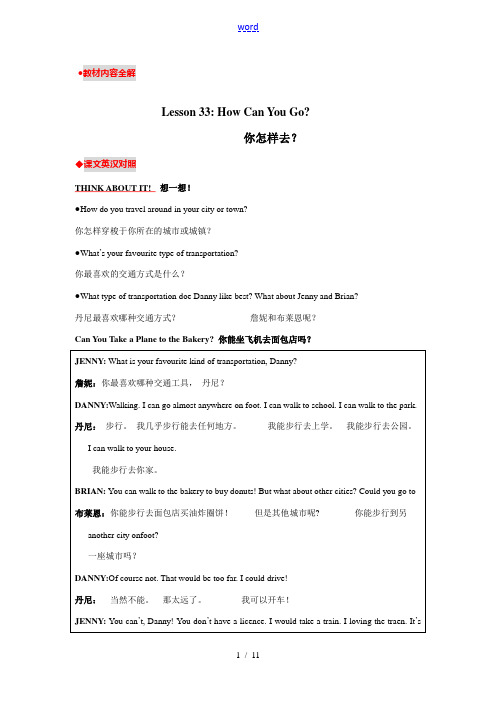
●教材内容全解Lesson 33: How Can You Go?你怎样去?◆课文英汉对照THINK ABOUT IT! 想一想!●How do you travel around in your city or town?你怎样穿梭于你所在的城市或城镇?●What’s your favourite type of transportation?你最喜欢的交通方式是什么?●What type of transportation doe Danny like best? What about Jenny and Brian?丹尼最喜欢哪种交通方式?詹妮和布莱恩呢?Can Y ou Take a Plane to the Bakery? 你能坐飞机去面包店吗?JENNY: What is your favourite kind of transportation, Danny?詹妮:你最喜欢哪种交通工具,丹尼?DANNY:Walking. I can go almost anywhere on foot. I can walk to school. I can walk to the park. 丹尼:步行。
我几乎步行能去任何地方。
我能步行去上学。
我能步行去公园。
I can walk to your house.我能步行去你家。
BRIAN: You can walk to the bakery to buy donuts! But what about other cities? Could you go to 布莱恩:你能步行去面包店买油炸圈饼!但是其他城市呢? 你能步行到另another city onfoot?一座城市吗?DANNY:Of course not. That would be too far. I could drive!丹尼:当然不能。
那太远了。
我可以开车!JENNY: You can’t, Danny! You don’t have a licence. I would take a train. I loving the traen. It’sLET’S DO IT! 做一做!Suppose you are going to the bookstore this Sunday, or that you and your classmates are going 假设这个星期天你要去书店,或者你和你的同班同学要去to far-away place. Discuss eith them how you will get there. What type of transportation will you 一个遥远的地方。
新概念英语第二册Lesson33

♂ towards
prep. 向, 朝, 接近
We have to try hard towards success. 我们要努力朝成功前进 He is walking towards here. 他正朝这边走来。
♂ rock n. 岩石,礁石;摇滚乐;摇摆 v, 摇摆;震惊 n.①岩石,大石头 The house is built on a rock. Mountains are made of rock. climb up a rock爬上岩石 v.①摇摆 ②震动 当我走到船的一边时,船摇晃了 When I stepped onto the side of the boat,it rocked. rock a baby to sleep / rock a baby asleep 摇婴儿睡觉 Our boat rocked to and from on the waves. The President’s death rocked the nation. ['prezɪd(ə)nt] 总统的死震动了全国 搭配: as firm as a rock 屹立不动的,值得信赖的 rock the boat 破坏团体的合作
1.Nearly a week passed before the girl was able to explain what had happened to her. He passed my house this morning. Past? past不是动词,它可以用作介词、形容词、副词和名词: He walked past my house. (介词) He told me about his past experience. (形容词) He seems似乎 to live in the past. (名词) be able to and Can can表示总的能力或客观存在的能力,而be able to 表示的是特定 的、具体的能力,强调不仅具备了某种能力,而且还实际做到了 或将会做到。 He could walk forty miles a day in the past. (具备这种能力,但不一定实际去做。) He was able to walk forty miles a day last year. (不仅具有这种能力,而且实际做了。) We will be able to finish the work next month. You might be able to persuade him. [pə‘sweɪd] 说服
新概念英语第2册课程讲义Lesson33
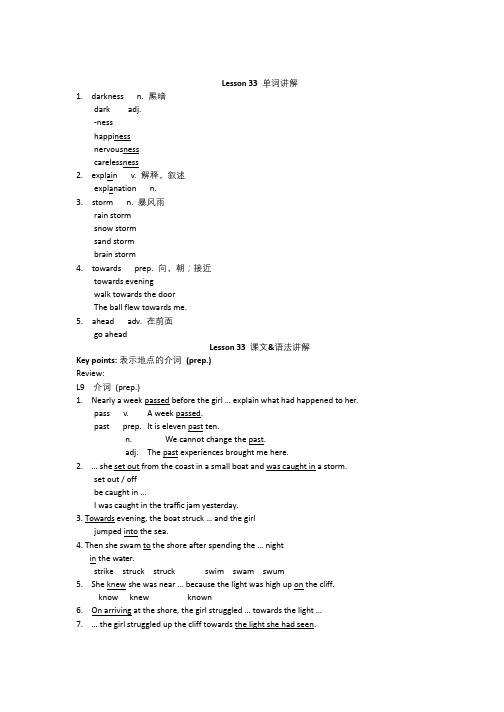
Lesson 33 单词讲解1. darkness n. 黑暗dark adj.-nesshappinessnervousnesscarelessness2. explain v. 解释,叙述explanation n.3. storm n. 暴风雨rain stormsnow stormsand stormbrain storm4. towards prep. 向,朝;接近towards eveningwalk towards the doorThe ball flew towards me.5. ahead adv. 在前面go aheadLesson 33 课文&语法讲解Key points: 表示地点的介词(prep.)Review:L9 介词(prep.)1. Nearly a week passed before the girl … explain what had happened to her.pass v. A week passed.past prep. It is eleven past ten.n. We cannot change the past.adj. The past experiences brought me here.2. … she set out from the coast in a small boat and was caught in a storm.set out / offbe caught in …I was caught in the traffic jam yesterday.3. Towards evening, the boat struck … and the girljumped into the sea.4. Then she swam to the shore after spending the … nightin the water.strike struck struck swim swam swum5. She knew she was near … because the light was high up on the cliff.know knew known6. On arriving at the shore, the girl struggled … towards the light …7. … the girl struggled up the cliff towards the light she had seen.the light (that/which) she had seen8. That was all she remembered.all (that) she remembered表示地点的介词(prep.) setout from the coast swam tothe shore towards the light shehad seen jumped into the seaout of darkness表示地点的介词(prep.)arriving at the shoreon the cliffin a small boat / in a storm / in hospital表示地点的介词(prep.)•Don’t throw the rubbish ______ the window.•Please come ______ the classroom and join us.•He is in Shanghai, and he will fly ______ Shanghai ______ Beijing.•She hopes that she will stand ______ the top of the highest mountain some day.•It is impolite to point ______ people.•I put the laptop ______ your bag.Lesson 33 知识拓展高考新题型单词拼写He tried to ________ (解释), but she wouldn’t listen.explain v. explanation n. ( 陕西) set out todo sth. set off to do sth.set about doing sth.set up + n.set down + n.We ______ to paint the whole house but finished only the front part that day.A. set aboutB. set upC. set outD. set down( 全国12)We ______ to paint the whole house but finished only the front part that day.A. set aboutB. set upC. set outD. set down( 全国12)Armed with the information you have gathered, you can ______ preparing your business plan.A. set outB. set aboutC. set offD. set up( 浙江15)Armed with the information you have gathered, you can ______ preparing your business plan.A. set outB. set aboutC. set offD. set up( 浙江15)-I probably shouldn’t have any more cake.-Oh, ______. It won’t kill you.A. go aheadB. hold on, pleaseC. you’re welcomeD. that’ll do( 辽宁35)-I probably shouldn’t have any more cake.-Oh, ______. It won’t kill you.A. go aheadB. hold on, pleaseC. you’re welcomeD. that’ll do( 辽宁35)阅读理解介词•Some of the best housing ________ London is never advertised but is passed on from one group of students to another by word of mouth.•( 浙江阅读B)阅读理解介词•Neither philosopher lived ________ times of peace, though there were more wars ________ Greece than ________ China.•( 江西阅读C)阅读理解介词•Andy rode slowly ________ his way to school, day-dreaming about the fishing trip that his father had promised him.•( 江西阅读A)阅读理解介词•________ the road to the harbour we could see the terrible destruction ________ the coast, but the harbour itself was in fairly good shape.•( 湖北阅读A)阅读理解介词•Joyce stayed ________ home, cooking and cleaning like a typical housewife of the time, though everything took three times as long.•( 陕西阅读C)。
新概念英语第三册Lesson33

unforeseen a. 意料之外的
an unforeseen blow/ incident 意外打击/事件 foresee v. 预见,预知 = see beforehand / in advance
(foresaw,foreseen,foreseeing ) No one can foresuture.
A Day to Remember
prelude n.序幕;前奏
be a prelude to sth.成为...的前奏曲 The breakthrough of the Prison was a prelude to French Revolution. The German invasion of Poland marked a prelude to World War II.
windscreen n.挡风玻璃(Br.)
screen n.屏幕;屏风 wind shield (Am.) 挡风玻璃 screen savor 屏保 sunscreen /sun cream n.防晒霜
slide n./v.沿平面滑行;滑梯(slid,slid)幻灯片
go into a slide 滑了一下 The car went into a slide on the wet road. snowslide n.雪崩 landslide n.山崩
slip v./n.滑到,摔倒
The man slipped on the icy road and broke his right leg. slip one's mind/memory 忘了 Your name is on the tip of my tongue,but it slipped my mind.
新概念英语第二册听力及翻译Lesson 33

新概念英语第二册听力及翻译Lesson 33Lesson 33 Out of the darkness 冲出黑暗First listen and then answer the question.听录音,然后回答以下问题。
Why was the girl in hospital?Nearly a week passed before the girl was able to explain what had happened to her. One afternoon she set out from the coast in a small boat and was caught in a storm. Towards evening, the boat struck a rock and the girl jumped into the sea. Then she swam to the shore after spending the whole night in the water. During that time she covered a distance of eight miles. Early next morning, she saw a light ahead. She knew she was near the shore because the light was high up on the cliffs. On arriving at the shore, the girl struggled up the cliff towards the light she had seen. That was all she remembered. When she woke up a day later, she found herself in hospital.New words and expressions 生词和短语darkness n.黑暗shore n.海岸explain v. 解释,叙述light n. 灯光coast n.海岸ahead adv. 在前面storm n.暴风雨cliff n.峭壁towards prep. 向,朝;接近struggle v.挣扎rock n.岩石,礁石hospital n. 医院Notes on the text 课文注释1 set out,出发,动身。
新概念英语第3册Lesson 33笔记
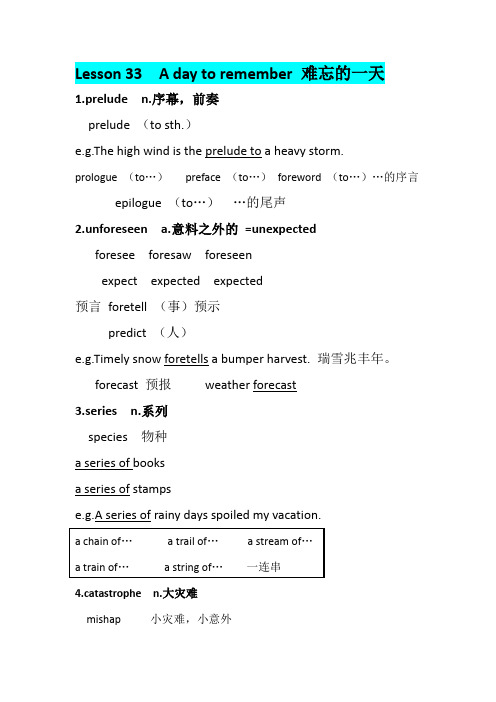
Lesson 33 A day to remember 难忘的一天1.prelude n.序幕,前奏prelude (to sth.)e.g.The high wind is the prelude to a heavy storm.prologue (to…)preface (to…)foreword (to…)…的序言epilogue (to…)…的尾声2.unforeseen a.意料之外的=unexpectedforesee foresaw foreseenexpect expected expected预言foretell (事)预示predict (人)e.g.Timely snow foretells a bumper harvest. 瑞雪兆丰年。
forecast 预报weather forecast3.series n.系列species 物种a series of booksa series of stampse.g.A series of rainy days spoiled my vacation.a chain of… a trail of… a stream of…a train of… a string of…一连串4.catastrophe n.大灾难mishap 小灾难,小意外accidentcontingencydisaster 大灾难(死几百人多)calamity catastrophe5.crockery n.陶器potteryearthenwarechina 瓷器chinawareporcelain6.suburb n.郊区suburbanrural 农村的urban 城市的metropolitan 特大城市cosmopolitan 国际型大都市7.panic n.惊慌get into a panic 陷入恐慌in a panic 惊慌失措e.g.He fled in a panic.e.g.Don’t panic in case of fire.8.stray a. 迷路的,偏离的v.迷路,偏离a stray dog/ boy/ bulletstray sheep 迷途羔羊e.g.Some of the cattle have strayed.e.g.Don’t stray from the point. 不要偏题。
七年级英语下册Lesson33教材内容详解冀教版
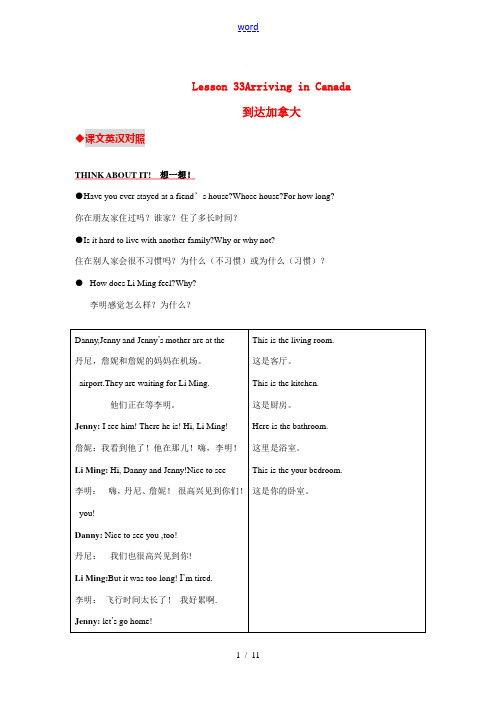
Lesson 33Arriving in Canada到达加拿大◆课文英汉对照THINK ABOUT IT! 想一想!●Have you ever stayed at a fiend’s house?Whose house?For how long?你在朋友家住过吗?谁家?住了多长时间?●Is it hard to live with another family?Why or why not?住在别人家会很不习惯吗?为什么(不习惯)或为什么(习惯)?●How does Li Ming feel?Why?李明感觉怎么样?为什么?Danny,Jenny and Jenny’s mother are at the丹尼,詹妮和詹妮的妈妈在机场。
airport.They are waiting for Li Ming.他们正在等李明。
Jenny: I see him! There he is! Hi, Li Ming!詹妮:我看到他了!他在那儿!嗨,李明!Li Ming: Hi, Danny and Jenny!Nice to see李明:嗨,丹尼、詹妮!很高兴见到你们!you!Danny: Nice to see you ,too!丹尼:我们也很高兴见到你!Li Ming:But it was too long! I’m tired.李明:飞行时间太长了!我好累啊. Jenny: let’s go home! This is the living room. 这是客厅。
This is the kitchen.这是厨房。
Here is the bathroom.这里是浴室。
This is the your bedroom. 这是你的卧室。
LET’S DO IT!做一做!Imagine you are living with another family. In a small group,write a dialogue about 假设你正住在别人家。
- 1、下载文档前请自行甄别文档内容的完整性,平台不提供额外的编辑、内容补充、找答案等附加服务。
- 2、"仅部分预览"的文档,不可在线预览部分如存在完整性等问题,可反馈申请退款(可完整预览的文档不适用该条件!)。
- 3、如文档侵犯您的权益,请联系客服反馈,我们会尽快为您处理(人工客服工作时间:9:00-18:30)。
Lesson33&May&be& ;amp;you&will&be&
amp;a&teacher
本文从网络收集而来,上传到平台为了帮到更多的人,如果您需要使用本文档,请点击下载按钮下载本文档(有偿下载),另外祝您生活愉快,工作顺利,万事如意!
Lesson33maybeyouwillbeateacher说课稿
各位老师,大家好:
很高兴能够参与这次讲课,并且在这里进行英语说课。
我要说课的内容是冀教版中学英语八年级上册中的Lesson33maybeyouwillbeateacher!
下面,我将主要从说教材、说教法与学法、说教学过程教学评价等几个方面来谈谈自己的对本节课的处理!
【教材分析】
本节课是冀教版中学英语八年级上册Lesson33maybeyouwillbeateacher!
本届课是及第四单元《我的社区》结束后的第一节课,第四单元讲的未来的社区,本单元主要讲的是我的未来,而本节课主要是在学生掌握了一定的日常用语,了解了一些社区知识的基础上,以第三单元《自己最喜欢的学科》为背景,展开描述自己的未来。
【教学目标设计】
.知识目标:会说新future,scary,might,carefully,sick 掌握新句型t`s+adj.+todosth.并能熟练运用新句型进行交流。
2.能力目标:能简单描述自己的未来,能询问和谈论将要发生的事情;小组活动,相互协作编织自己的未来!
情感目标:在学习谈论过程中,学会和同学分享自己的经历做法,并从中体会到分享所带来快乐,感受未来所带给我们的乐趣,享受未来美好的事物;从而树立正确的人生观和价值观。
2)学会用恰当的方式表达赞扬别人或欣赏推荐自己的观点;
教学重点及难点
重点:学会表达自己的未来
难点:学生对于so句型得到练习并掌握!
二,教法:
我的具体语言目标都是通过各种各样的Tasks来实现的;《我的未来》需要学生运用具体而特定的行动来完成一定的语言交流.比如说,因为begoodat,所以wanttobe.所以要求学生用自己身临其境的状态去创造自己的语言!整个教学过程中,各种语言结构,语言功能,不同的学习任务等的要求.因此我选用了以下教学
方法;
.采用多媒体上课,用几张特别出名的任务幻灯片来导入.吸引学生的课堂注意力.以及对本节课的兴趣。
2.用听说法,和观察法引导学生将话题到未来的话题。
3.在学生活动环节,设置小组讨论形式,采用情景交际法.或个人演讲的形式。
4.在整堂课的设计上,体现了任务型教学.采用竞赛性课堂,把课堂还给学生,让他们发挥表现!
三,学法:
.培养学生的预习能力.课前做好有关这一部分重点的预习指导.像课后学生的活动环节,是通过对整个第五单元的预习来完成的,
2.培养学生,想象力,记忆力以及逻辑表达能力.
3.在教学过程中创造积极互动的语言氛围,让学生在乐中学.调动学生学习积极性.例如,catsliketoeatfish,sodosethatdog!catsliketoeatmouse,sodod ogs!从此例中,让学生感受到语言是互通的,中国的历史文化,也照样可以用英语表达出来,所以他们就可能会更加理解英语就是一门工具,有必要学好它,掌握它!
四,学生分析:
经过一年的学习,初二学生有了一点的英语基础知识和能力,正逐渐向读,写过渡.同时,学生们对英语学习还保持着较浓厚的兴趣.,在课堂上能和我进行一些配合.但是好多次英语交流不是很流畅!
本文从网络收集而来,上传到平台为了帮到更多的人,如果您需要使用本文档,请点击下载按钮下载本文档(有偿下载),另外祝您生活愉快,工作顺利,万事如意!。
